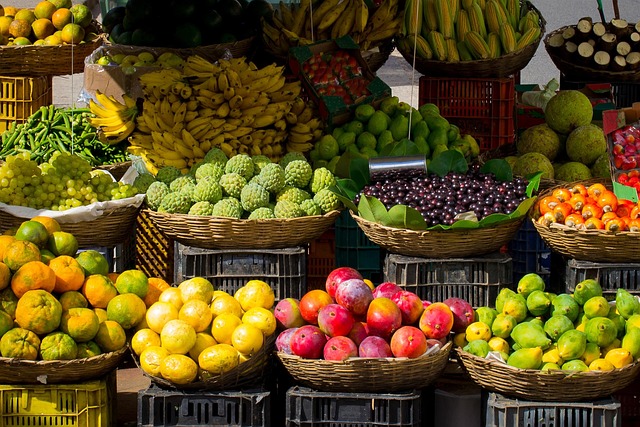Are you looking to make a positive impact on your local economy while enjoying fresh, nutritious food? Look no further than your local farmers’ market. Investing in local food not only benefits your health, but it also brings several economic advantages to your community.
Benefits of Supporting Farmers’ Markets
Supporting farmers’ markets directly supports local farmers and stimulates economic growth. By shopping at farmers’ markets, you are putting money back into the local economy, as farmers are able to keep a larger share of the profits compared to selling through intermediaries. This helps create jobs and supports small-scale agricultural operations, which are the backbone of many communities.
In addition to the economic benefits, buying from farmers’ markets also guarantees the freshness and quality of the produce. You can trust that what you buy is locally grown, often pesticide-free, and harvested at its peak ripeness. The direct connection with the farmers themselves allows you to learn about their farming practices and build relationships that foster a sense of community and trust.
Investing in local food by supporting farmers’ markets is a win-win for both your community and your plate. Join the movement and experience the economic and health benefits it brings.
Increased Revenue for Local Farmers
One of the primary economic benefits of supporting farmers’ markets is the increased revenue it generates for local farmers. When you purchase produce directly from the farmer, they are able to keep a larger portion of the profits compared to selling through traditional retail channels or to larger distributors.
This is because farmers’ markets eliminate the middlemen, allowing farmers to set their own prices and retain a greater share of the final sale price. In traditional supply chains, farmers often receive only a small fraction of the retail price, with the majority of the profits going to wholesalers, distributors, and retailers. By cutting out these intermediaries, farmers’ markets enable farmers to earn a fairer wage for their hard work and dedication.
Moreover, farmers’ markets provide an opportunity for small-scale and diversified farmers to thrive. These types of farms are often unable to compete with large-scale industrial agriculture operations in the conventional grocery market, but they can find success by selling directly to consumers at farmers’ markets. This helps to sustain the livelihoods of local farmers and ensures the continued viability of small-scale agriculture in your community.
Job Creation and Economic Growth
In addition to supporting local farmers, investing in farmers’ markets also helps to stimulate broader economic growth and job creation within your community. When you spend your money at a farmers’ market, those dollars circulate within the local economy, rather than being siphoned off to distant corporate headquarters or shareholders.
This local economic multiplier effect has been well-documented by researchers. Studies have shown that for every $1 spent at a farmers’ market, an additional $1.60 to $2.60 is generated in the local economy through increased sales, jobs, and tax revenue. This is because the money spent at the farmers’ market is more likely to be re-spent within the community, supporting other local businesses and services.
The job creation benefits of farmers’ markets are also significant. In addition to providing employment for the farmers themselves, farmers’ markets also support a variety of ancillary businesses, such as food processors, artisanal producers, and food service providers. These businesses, in turn, create additional jobs and economic opportunities for community members. Furthermore, the increased foot traffic and vibrancy generated by a successful farmers’ market can attract new businesses and investments to the surrounding area, further boosting local economic development.
Tourism and Increased Spending
Farmers’ markets can also serve as a powerful draw for tourists and visitors, generating additional economic benefits for the local community. Many travelers, both domestic and international, are increasingly seeking out unique, authentic experiences that connect them with the local culture and cuisine. Farmers’ markets provide an ideal platform for showcasing the region’s agricultural bounty, artisanal products, and culinary traditions.
When tourists and visitors come to your community to experience the farmers’ market, they don’t just spend money on the produce and goods sold by the vendors. They also patronize local restaurants, shops, and attractions, injecting additional revenue into the local economy. This can have a ripple effect, leading to the creation of new businesses, jobs, and tax revenue that benefit the entire community.

Moreover, a thriving farmers’ market can also serve as a powerful marketing tool for your community, attracting new residents, businesses, and investments. A well-run and visually appealing farmers’ market can showcase the vibrancy, creativity, and entrepreneurial spirit of your local area, making it an attractive destination for those seeking a high quality of life and a strong sense of community.
Environmental Sustainability and Reduced Carbon Footprint
Supporting farmers’ markets not only benefits the local economy, but it also contributes to environmental sustainability and reduces the carbon footprint of your food consumption. When you purchase produce and other goods from local farmers, you are supporting agricultural practices that are often more environmentally friendly and sustainable than the industrial, globalized food system.
Local farmers typically use fewer synthetic fertilizers and pesticides, employ more sustainable farming methods, and prioritize soil health and biodiversity. This helps to reduce the environmental impact of food production, preserving the natural resources and ecosystems that are essential for long-term agricultural viability. Additionally, the reduced transportation distances associated with local food systems result in lower greenhouse gas emissions and a smaller carbon footprint compared to food that is shipped from distant locations.
Furthermore, by supporting local farmers’ markets, you are helping to preserve and protect the agricultural land and open spaces within your community. Thriving local food systems can serve as a bulwark against the encroachment of urban sprawl and the conversion of farmland to non-agricultural uses. This, in turn, helps to maintain the scenic beauty and ecological integrity of your region, while also safeguarding the livelihoods of local farmers and the long-term food security of your community.
Health and Wellness Benefits of Local Food
In addition to the economic and environmental benefits, investing in local food through farmers’ markets can also have significant positive impacts on your health and well-being. The produce sold at farmers’ markets is typically harvested at the peak of ripeness, ensuring maximum nutrient density and flavor. This is in contrast to the fruits and vegetables found in conventional grocery stores, which are often picked before they are fully ripe and then shipped long distances, resulting in a loss of nutrients and taste.
Furthermore, many farmers’ market vendors use organic or sustainable growing practices, which means their produce is free from harmful pesticides and synthetic chemicals. This not only benefits the environment but also your personal health, as consuming pesticide-free foods can reduce your exposure to toxic substances and potential health risks.
The direct connection with the farmers at farmers’ markets also allows you to learn about the growing methods and production practices used to cultivate the food you consume. This transparency and traceability can give you greater peace of mind and confidence in the quality and safety of the food you are purchasing. Additionally, building relationships with local farmers can foster a sense of community and trust, which can have positive impacts on your overall well-being and quality of life.
Building a Sense of Community and Social Connections
Investing in local food through farmers’ markets can also have a profound impact on the social fabric of your community. When you regularly visit your local farmers’ market, you have the opportunity to interact with the farmers, artisans, and fellow community members who make up the vibrant tapestry of your local food system.
These interactions and relationships can help to foster a greater sense of community and social cohesion. By engaging directly with the people who grow and produce your food, you can gain a deeper understanding and appreciation for the hard work and dedication that goes into sustainable food production. This, in turn, can inspire a greater sense of stewardship and commitment to supporting local agriculture and food systems.
Moreover, farmers’ markets can serve as a gathering place for community members, providing a space for social interaction, cultural exchange, and the celebration of local traditions and heritage. These social connections can help to build a stronger sense of community identity and belonging, which can have positive impacts on mental health, civic engagement, and overall quality of life.
How to Support Local Farmers’ Markets
If you’re convinced of the economic, environmental, and social benefits of investing in local food through farmers’ markets, there are several ways you can get involved and show your support:
- Attend your local farmers’ market regularly: Make it a habit to visit your local farmers’ market every week or every other week. This consistent patronage helps to ensure the long-term viability and success of the market.
- Spread the word: Share your positive experiences and the benefits of supporting local farmers’ markets with your friends, family, and community members. Word-of-mouth is a powerful tool for driving awareness and increasing participation in these important community assets.
- Volunteer or get involved: Many farmers’ markets rely on the support of dedicated volunteers to help with tasks such as set-up, customer service, and event planning. Consider donating your time and skills to support the market’s operations.
- Advocate for policies that support local food systems: Stay informed about local and regional policies that impact farmers’ markets and agricultural land use. Attend public meetings, write to your elected officials, and participate in advocacy efforts to ensure that your community’s food system remains strong and resilient.
- Explore value-added products and services: In addition to purchasing fresh produce, consider supporting local artisanal producers, food processors, and other businesses that are part of the local food ecosystem. This helps to diversify the offerings at the farmers’ market and strengthen the overall local economy.
- Participate in community events and activities: Many farmers’ markets host a variety of community events, such as cooking demonstrations, live music, and educational workshops. Attend these events to deepen your connection with the local food community and support the market’s role as a gathering place.
Conclusion: The Importance of Investing in Local Food for Economic Prosperity
In conclusion, investing in local food by supporting your local farmers’ market is a powerful way to drive economic prosperity, environmental sustainability, and community well-being in your local area. By putting your money directly into the hands of local farmers and producers, you are helping to create jobs, stimulate economic growth, and preserve the agricultural heritage and natural resources that are essential for the long-term viability of your community.
Moreover, the health and social benefits of engaging with your local food system can have a profound impact on your personal well-being and the overall quality of life in your community. When you choose to support your local farmers’ market, you are not just buying fresh, nutritious food – you are also investing in the future of your community and contributing to a more sustainable, equitable, and resilient food system.
So, the next time you’re planning your weekly grocery trip, consider making a detour to your local farmers’ market. The economic, environmental, and social dividends of this small but impactful investment will continue to pay dividends for years to come, benefiting both you and your community. Join the growing movement of conscious consumers who are committed to building a more prosperous, sustainable, and connected local food system.
